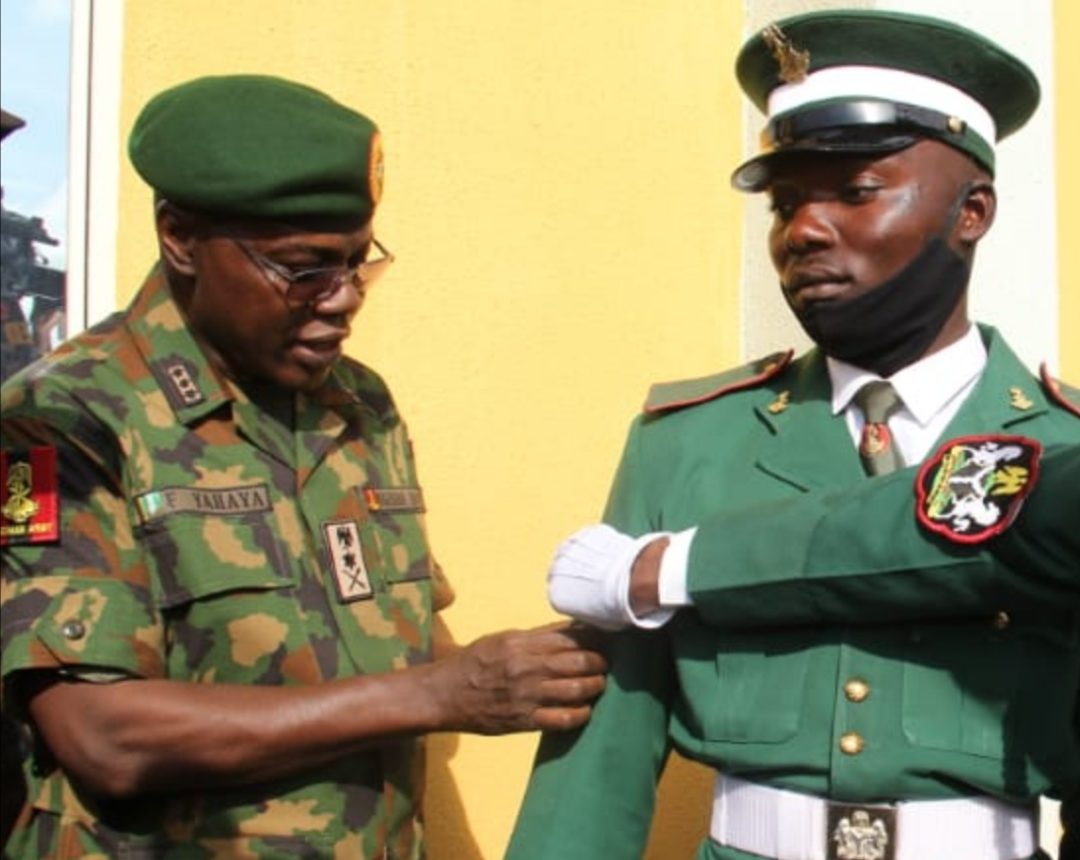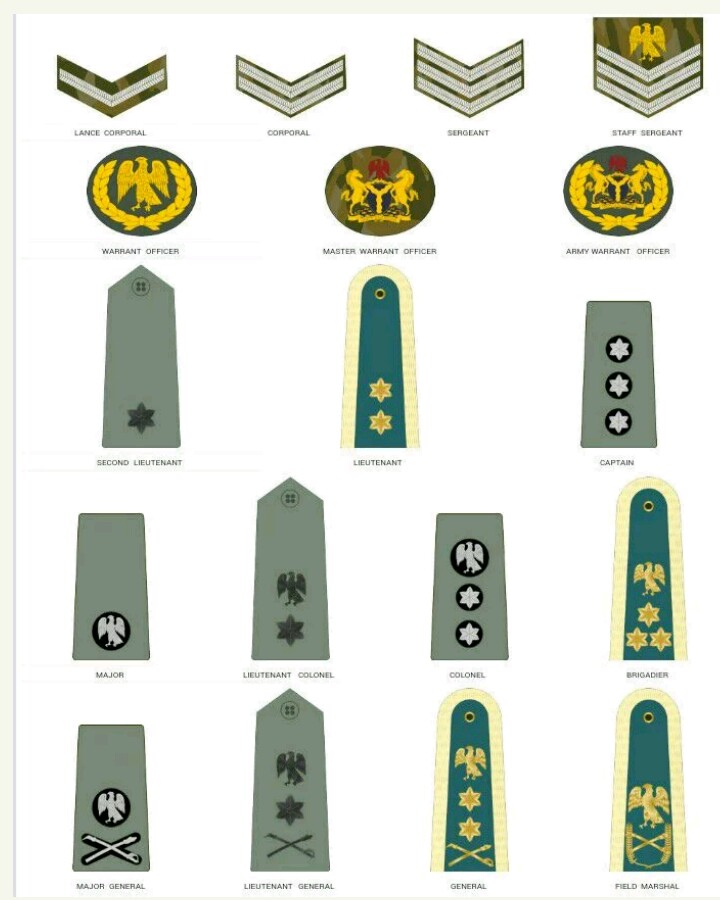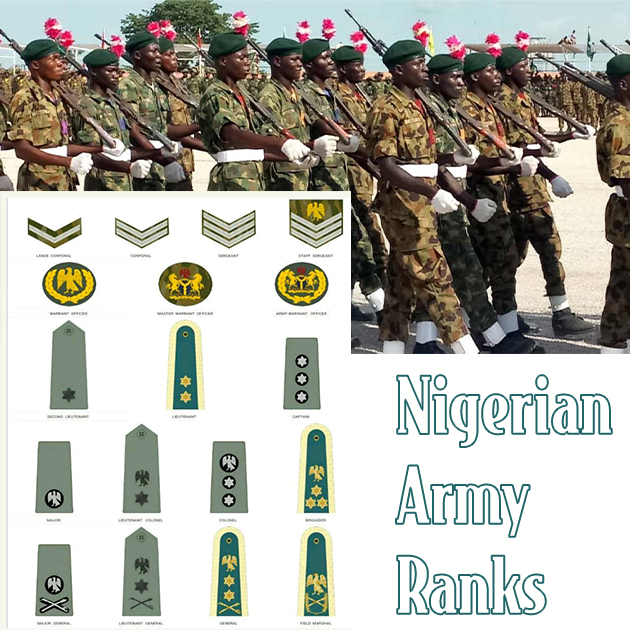Ranks In The Nigerian Military are hierarchical levels of authority in Nigeria's armed forces. For instance, the Chief of Army Staff holds the rank of Lieutenant General.
Ranks denote different levels of responsibility, expertise, and compensation. Historically, ranks emerged from the military need for organization and discipline.
This article will delve into the various ranks within the Nigerian military, their corresponding insignia, and the duties and responsibilities associated with each.
Ranks In The Nigerian Military
Ranks in the Nigerian military are essential for maintaining discipline, establishing lines of authority, and recognizing the experience and competence of service members.
- Hierarchy
- Authority
- Discipline
- Responsibility
- Experience
- Competence
- Leadership
- Progression
- Recognition
- Insignia
These aspects are interconnected and contribute to the overall effectiveness of the Nigerian military. For example, the hierarchy of ranks ensures that orders are followed and that there is a clear chain of command. The authority associated with each rank allows service members to carry out their duties and responsibilities effectively. Discipline is maintained through the enforcement of rank regulations and the adherence to military law. Recognition of rank fosters a sense of pride and camaraderie among service members and helps to build esprit de corps.
Hierarchy
Hierarchy, a fundamental aspect of Ranks in the Nigerian Military, establishes a structured framework of authority and responsibility within the armed forces. Composed of various levels of command, it governs the flow of information, decision-making, and accountability.
- Chain of Command
The chain of command defines the lines of authority and responsibility, ensuring that orders are relayed efficiently and executed effectively.
- Rank Insignia
Rank insignia, displayed on uniforms, visibly represents the hierarchical structure, allowing for easy identification of authority and fostering respect.
- Promotion System
The promotion system provides a clear path for career advancement, rewarding merit, experience, and leadership qualities.
- Discipline and Order
Hierarchy facilitates discipline and order by establishing clear expectations, responsibilities, and consequences for actions.
Overall, the hierarchical structure of Ranks in the Nigerian Military is essential for maintaining discipline, fostering a sense of order and accountability, and ensuring the smooth functioning of the armed forces.
Authority
Authority, a fundamental aspect of Ranks in the Nigerian Military, signifies the power and right to make decisions and give orders. It is vested in individuals based on their rank and position within the hierarchical structure.
- Decision-Making
Authority empowers individuals to make critical decisions that affect their subordinates, units, and the overall mission.
- Command
Authority enables the issuance of commands and directives, ensuring that orders are carried out efficiently and effectively.
- Discipline
Authority allows for the enforcement of discipline and the maintenance of good order within the ranks.
- Accountability
Authority implies accountability, holding individuals responsible for their actions and decisions.
In sum, Authority within Ranks in the Nigerian Military encompasses the ability to make decisions, issue commands, enforce discipline, and hold individuals accountable. These facets are crucial for maintaining order, ensuring mission success, and fostering a culture of respect and responsibility.
Discipline
Discipline is the foundation upon which Ranks in the Nigerian Military are built. It is the unwavering adherence to rules, regulations, and ethical standards that governs the conduct and behaviour of military personnel. Discipline fosters order, efficiency, and mission success.
As a critical component of Ranks in the Nigerian Military, discipline ensures that orders are carried out promptly and precisely, maintains a high level of readiness, and fosters a sense of unity and esprit de corps. It promotes respect for authority, encourages teamwork, and ensures that all members of the military are held accountable for their actions.
Real-life examples of discipline within Ranks in the Nigerian Military abound. From the daily routines of physical training and drill to the execution of complexdiscipline is evident at every level. The prompt obedience of junior officers to the commands of their superiors, the meticulous maintenance of equipment, and the adherence to ethical codes of conduct are all testaments to the high level of discipline that exists within the Nigerian military.
The practical applications of understanding the connection between Discipline and Ranks in the Nigerian Military are far-reaching. It enhances operational effectiveness, fosters a culture of professionalism, and strengthens the military's reputation. Discipline ensures that the military remains a trusted and respected institution, capable of defending the nation and its interests.
Responsibility
Responsibility, a cornerstone of Ranks in the Nigerian Military, is the obligation and duty bestowed upon individuals based on their rank and position. It encompasses a wide range of tasks, decisions, and actions that are essential for the effective functioning of the military.
Responsibility is intimately connected to Ranks in the Nigerian Military. Higher ranks carry greater responsibilities, as individuals are entrusted with more complex tasks and decision-making. This includes leading and managing larger units, planning and executing operations, and ensuring the welfare and well-being of subordinates.
Real-life examples of Responsibility within Ranks in the Nigerian Military are numerous. Company Commanders are responsible for the training, discipline, and operational readiness of their units. Battalion Commanders are responsible for planning and conducting combat operations, as well as coordinating with other units and higher headquarters. Brigade Commanders are responsible for overseeing multiple battalions and ensuring the accomplishment of assigned missions.
Understanding the connection between Responsibility and Ranks in the Nigerian Military has practical applications. It helps individuals at all levels to appreciate the importance of their roles and the impact of their decisions. It fosters a sense of accountability and ownership, driving individuals to perform their duties to the best of their ability.
In summary, Responsibility is a critical component of Ranks in the Nigerian Military, shaping the duties, obligations, and expectations of military personnel. It is a driving force behind the effectiveness and professionalism of the military, ensuring that individuals are held accountable for their actions and that the organization as a whole can achieve its objectives.
Experience
Experience is a crucial aspect of Ranks in the Nigerian Military, serving as a cornerstone for professional development, operational effectiveness, and leadership. It encompasses the knowledge, skills, and expertise acquired through years of training,, and real-world operations.
- Combat Experience
Combat experience is invaluable for military personnel, providing firsthand knowledge ofand tactics, as well as the ability to make critical decisions under pressure.
- Leadership Experience
Leadership experience, gained through commanding units or serving in staff positions, develops the skills necessary to inspire, motivate, and guide subordinates.
- Technical Experience
Technical experience in specialized fields, such as engineering, medicine, or communications, is essential for the effective operation and maintenance of military equipment and systems.
- Institutional Experience
Institutional experience, acquired through attending military academies and professional development courses, provides a solid foundation in military theory, history, and ethics.
Experience plays a significant role in determining promotions and assignments within Ranks in the Nigerian Military. Officers with extensive combat experience are often selected for leadership positions, while those with specialized technical expertise are sought after for technical roles. Experience also provides a competitive edge in staff appointments and international deployments.
Competence
Competence is the cornerstone upon which Ranks in the Nigerian Military are built. It encompasses the knowledge, skills, and abilities required to effectively perform military duties and responsibilities. Competence is not merely theoretical knowledge but rather a combination of proficiency, experience, and sound judgment.
The relationship between Competence and Ranks in the Nigerian Military is bidirectional. On one hand, competence is a prerequisite for promotion to higher ranks. Officers must demonstrate a high level of competence in their current roles before being considered for promotion. This ensures that only the most capable individuals rise through the ranks, leading to a more effective and professional military.
On the other hand, ranks provide opportunities for developing and enhancing competence. Higher ranks come with greater responsibilities and challenges, which require officers to continuously develop their skills and knowledge. Through on-the-job training, professional development courses, and operational experience, officers can hone their competence and become more effective leaders.
Real-life examples of competence within Ranks in the Nigerian Military abound. From the tactical proficiency of platoon commanders to the strategic acumen of generals, competence is evident at every level. Competent officers are able to make sound decisions under pressure, manage complex operations, and inspire their subordinates to achieve mission success.
Understanding the connection between Competence and Ranks in the Nigerian Military is crucial for both individual career development and organizational effectiveness. It highlights the importance of continuous learning, skill development, and professional growth. By recognizing and rewarding competence, the Nigerian Military fosters a culture of excellence and ensures that it remains a formidable force in the defense of the nation.
Leadership
Leadership is the lifeblood of Ranks in the Nigerian Military, the driving force behind mission success and organizational effectiveness. It is the ability to influence, motivate, and guide others to achieve shared goals.
Leadership is a critical component of Ranks in the Nigerian Military. Officers at all levels are expected to demonstrate leadership qualities, from platoon commanders leading their troops in combat to generals directing large-scale operations. Effective leadership fosters unit cohesion, enhances morale, and inspires individuals to go above and beyond the call of duty.
Real-life examples of leadership within Ranks in the Nigerian Military are numerous. One notable example is the leadership of General Yakubu Gowon during the Nigerian Civil War. His ability to unite the country and lead it to victory earned him widespread respect and admiration.
Understanding the connection between Leadership and Ranks in the Nigerian Military has practical applications. It helps to identify and develop future leaders, build effective teams, and create a positive work environment. By recognizing and rewarding leadership qualities, the Nigerian Military can ensure that it has the leaders it needs to meet the challenges of the 21st century.
Progression
Progression is inextricably linked to Ranks in the Nigerian Military, serving as both a cause and effect of the hierarchical structure. As individuals progress through the ranks, they assume greater responsibilities and leadership roles, driving the military's operational effectiveness and overall success.
Progression is a critical component of Ranks in the Nigerian Military. It provides a clear path for career advancement, rewarding merit, experience, and dedication. Through a system of promotions and appointments, deserving officers are recognized and given opportunities to grow and develop their leadership skills.
Real-life examples of Progression within Ranks in the Nigerian Military abound. Many distinguished officers have risen through the ranks, taking on increasingly challenging assignments and responsibilities. Lieutenant General Theophilus Danjuma, a former Chief of Army Staff, is a notable example of an officer who progressed through the ranks, leaving a lasting legacy of leadership and professionalism.
Understanding the connection between Progression and Ranks in the Nigerian Military has practical applications. It helps individuals set career goals, understand the criteria for promotion, and navigate the path to senior leadership positions. This knowledge fosters a culture of excellence and ambition, driving individuals to achieve their full potential.
Recognition
Recognition is a cornerstone of Ranks in the Nigerian Military, serving as a tangible expression of appreciation for service, dedication, and achievements. It takes various forms, each contributing to the morale, motivation, and overall effectiveness of the military.
- Medals and Decorations
Medals and decorations are awarded to recognize acts of valor, exceptional service, and outstanding contributions. They serve as visible symbols of honor and distinction, fostering a sense of pride and accomplishment among recipients.
- Promotions
Promotions are a form of recognition that acknowledge increased responsibilities, leadership qualities, and professional development. They provide tangible evidence of career progression and motivate individuals to strive for excellence.
- Appointments
Appointments to prestigious positions or assignments are a significant form of recognition. They demonstrate trust in an individual's abilities and provide opportunities for professional growth and leadership development.
- Public Acclaim
Public acclaim, such as parades and ceremonies, serves as a collective form of recognition. It acknowledges the contributions of the military as a whole and fosters a sense of national pride and appreciation.
Recognition within Ranks in the Nigerian Military is essential for maintaining morale, fostering a sense of accomplishment, and incentivizing excellence. It provides a framework for rewarding deserving individuals and encouraging them to continue their dedicated service to the nation.
Insignia
Insignia are an integral part of Ranks in the Nigerian Military, serving as visible symbols of authority, rank, and unit affiliation. They play a crucial role in maintaining discipline, fostering esprit de corps, and facilitating identification in combat situations.
As a critical component of Ranks in the Nigerian Military, insignia provide a clear and standardized way to distinguish between different ranks and units. This is essential for maintaining order and discipline, as it allows for quick and easy identification of individuals' roles and responsibilities. Insignia also contribute to a sense of pride and belonging, fostering esprit de corps and unit cohesion.
Real-life examples of insignia within Ranks in the Nigerian Military abound. Officers wear rank insignia on their shoulders, while enlisted personnel wear rank insignia on their sleeves. These insignia clearly indicate the rank and branch of service of the individual, allowing for easy identification in both formal and informal settings.
Understanding the connection between insignia and Ranks in the Nigerian Military has practical applications in various areas. It helps to identify individuals in the field, facilitate communication, and maintain discipline. Additionally, insignia play a role in military history and heraldry, providing valuable insights into the evolution of military ranks and traditions.
In conclusion, "Ranks In The Nigerian Military" are a complex and multifaceted system that plays a vital role in maintaining discipline, fostering leadership, and ensuring the effectiveness of the armed forces. Through a structured hierarchy, clear lines of authority, and a system of insignia and recognition, Ranks In The Nigerian Military provide a framework for professional development, career progression, and the preservation of military traditions.
Key takeaways from this exploration include the interconnectedness of hierarchy, authority, and responsibility; the importance of experience, competence, and leadership in shaping military ranks; and the role of insignia in maintaining order, discipline, and esprit de corps. Understanding these interconnections is crucial for comprehending the inner workings of the Nigerian Military and its significance in safeguarding the nation's security and interests.
Omillio sparks s biography net
Is keemokazi real name kareem
What is darien martin ethnicity

Nigerian Army Ranks and Salary 2023 Update Real Mina

Ranks in the Nigerian Army and symbols

Nigerian Army Ranks and Salary Structure The Updated List
ncG1vNJzZmidnJq5t3rApqpsZpSetKrAwKWmnJ2Ro8CxrcKeqmebn6J8s63NpKpmoZ5iwamxjKegoJ2inq6vecyio6KskafGb7TTpqM%3D